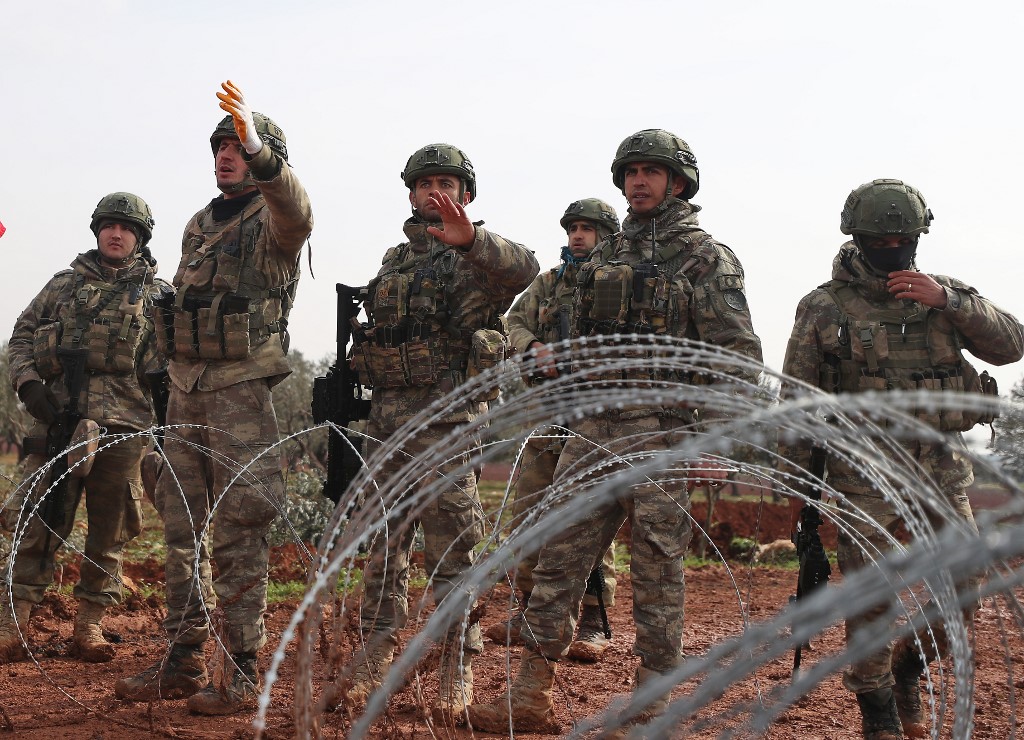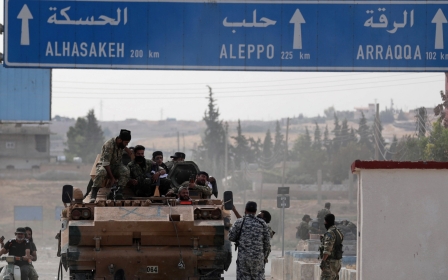Idlib offensive: Turkey's tradeoffs with Russia put it on the losing side

Syrian President Bashar al-Assad’s advance on Idlib province appears to be a disaster for Turkey. Ankara’s rebel allies have been rapidly overrun, while 13 soldiers have been killed while manning Turkey's observation posts.
Up to 800,000 people have been displaced, but Turkey has closed its border, reluctant to add to the 3.6 million Syrian refugees it already hosts.
Turkish President Recep Tayyip Erdogan has reacted angrily to the Syrian offensive, threatening retaliation - but his calls for Assad and his Russian ally to withdraw to previously agreed ceasefire lines have been ignored.
Long time coming
Yet, for all of Erdogan’s bluster, this was a long time coming. Assad has long coveted Idlib, vowing to reconquer “every inch” of Syria lost during the nine-year civil war against his rule, and Russia has helped him to break ceasefires elsewhere.
Stay informed with MEE's newsletters
Sign up to get the latest alerts, insights and analysis, starting with Turkey Unpacked
This assault fits an established pattern of Russian-Turkish tradeoffs in Syria, whereby Russia grants Turkey a territorial concession in exchange for turning a blind eye to an Assad advance elsewhere.
The pattern began with Operation Euphrates Shield in the summer of 2016, when Turkish forces, alongside their Syrian rebel allies, moved to push the Islamic State (IS) and the Kurdish People’s Protection Units (YPG) from Turkey’s border.
With Russia controlling western Syrian airspace, Moscow’s approval was needed, and a deal was struck. Turkey would gain a zone of influence between al-Bab and Jarablus, and in exchange Ankara would quietly end support for rebels in eastern Aleppo, facilitating Russia, Iran and Assad’s conquest of the city.
One possible future tradeoff with Russia may be to allow Turkey to expand the Peace Spring zone to house more displaced Syrians
A similar story played out in 2018. Turkey again needed Russian agreement to expand its zone westwards, to push the YPG out of Afrin. In exchange, Erdogan said little when Assad cleaved off the eastern third of the Idlib de-escalation zone that Turkey had theoretically guaranteed.
Similarly, though Turkey made noises of condemnation, it did little to prevent Assad from recapturing the three other de-escalation zones in Ghouta, Rastan and Daraa later that year.
In line with this pattern, the tradeoff linked to Assad’s latest attack on Idlib was Turkey’s Operation Peace Spring, launched in October 2019. It invaded northern Syria once more, pushing out the YPG and carving out another zone of influence from Tal Abyad to Ras-al-Ayn. Turkey didn’t need Russian permission this time, as eastern Syrian airspace was controlled by the US, which surprisingly facilitated the operation against its Kurdish allies. But Russian President Vladimir Putin soon endorsed the move by agreeing to joint Turkish-Russian border patrols - an effective legitimation of the occupation.
Turning a blind eye
Russia reaped further rewards. Washington’s sudden abandonment of the YPG allowed Moscow to broker a partial reconciliation between Assad and the Kurdish militia, allowing Assad to march into YPG-held territory east of the Euphrates.
Yet, this seems too small a prize for Russian acquiescence to Peace Spring, given it has long seen Kurdish-Assad reconciliation as an eventual likelihood anyway. It is likely that parts of Idlib were also on the table when the joint border patrol negotiations were underway. This might also have been discussed when Turkey and Russia called for a ceasefire in Libya in January.
Given the pattern of tradeoffs, Russia might have expected Turkey to turn a blind eye when Assad launched his assault on southern Idlib in late December of last year. Ankara had done little, beyond rhetorical outrage, when Assad took Khan Sheikhoun earlier that year.
From Ankara’s perspective, given that the Syrian government had struggled for months in Khan Sheikhoun, they may have hoped Assad’s forces would exhaust themselves with similar slow progress. It might have taken years for Assad to advance all the way up the coveted M5 and M4 highways, bogged down by rebel and jihadist forces. Every slow campaign gave Ankara more opportunities to wring concessions from Russia.
Instead, Assad’s blitzkrieg came with unprecedented speed and ferocity. Not only did his forces take the M5 highway to Aleppo within weeks, they then fanned out north of Syria’s second city, securing it from enemy rockets for the first time since 2012. While the Turkish president may have been expecting a long, drawn-out campaign around southern Idlib, he instead faced the partial collapse of the entire de-escalation zone.
The junior partner
Evidently, Erdogan miscalculated - yet for all his anger, talk of a breakdown in Russia-Turkey relations over Syria seems premature. Moscow still controls the airspace over Ankara’s zones of influence in Afrin and al-Bab, while Turkey remains the junior partner in a growing economic and security relationship. Indeed, for all their disagreement on Idlib, Turkey has been keen to emphasise that this won’t derail the wider Russia-Turkey relationship.
For this reason, Erdogan would struggle to follow up on his threats with a decisive retaliation against Assad. Having spent four years rebuilding Assad’s military, Russia would not likely allow Turkey to inflict serious damage on it without responding. It may, however, accept tokenistic losses that Assad could absorb, similar to the now-regular raids on Damascus from Israel.
Turkey’s pouring of troops and equipment into western Idlib suggests it wants to create new demarcation lines, to secure Idlib city and a slither of the former zone, rather than attempt to reconquer the lost lands. For this, it will eventually need to make another deal with Russia.
Though worried about refugees, Ankara can probably cope. It has already encouraged 250,000 fleeing Idlib to head to its other Syrian zones of influence, such as Afrin and al-Bab. It is also possible some will be bussed to Tal Abyad.
Moscow comes out on top
One of the reasons given for Operation Peace Spring was to create space for two million Syrian refugees. Though publicly this was meant to be from the 3.6 million already in Turkey, it is not overly cynical to think Erdogan had half an eye on Idlib. One possible future tradeoff with Russia may be to allow Turkey to expand the Peace Spring zone to house more displaced Syrians.
That said, it is clear that Turkey has not always read Russia well on Syria. While tradeoffs have directed the relationship, Moscow has always ended up in a stronger position. Whatever deal can be arranged for Turkey to salvage something from the Idlib zone, the course of the war so far suggests it will be short-lived.
Assad is determined to retake all of Syria, and Russia seems committed to helping him do it. Turkey may be winning some short-term tradeoffs, but losing on long-term strategic goals.
The views expressed in this article belong to the author and do not necessarily reflect the editorial policy of Middle East Eye.
Middle East Eye delivers independent and unrivalled coverage and analysis of the Middle East, North Africa and beyond. To learn more about republishing this content and the associated fees, please fill out this form. More about MEE can be found here.







